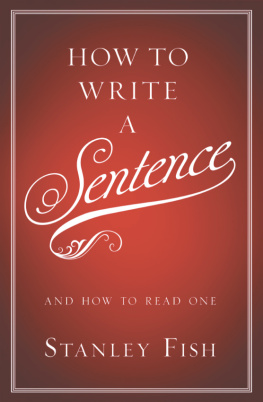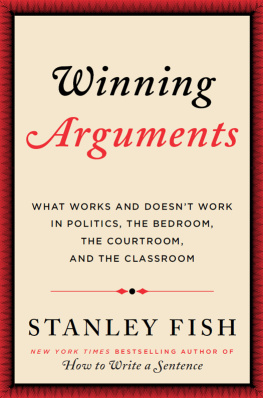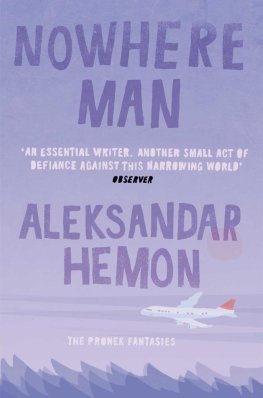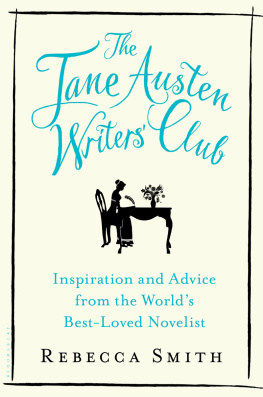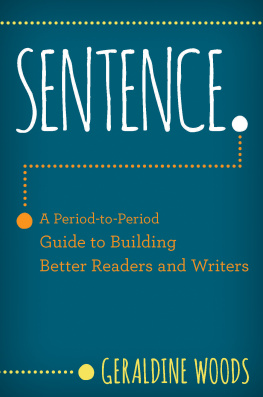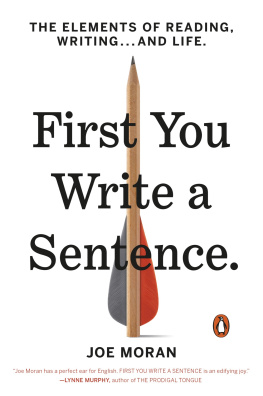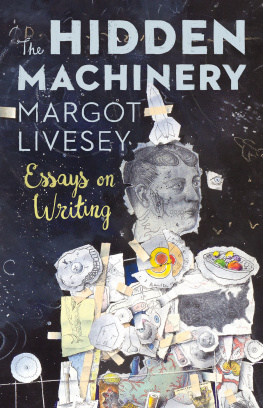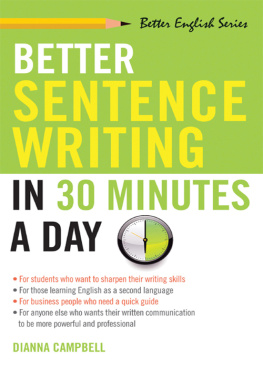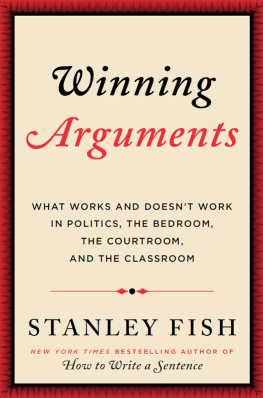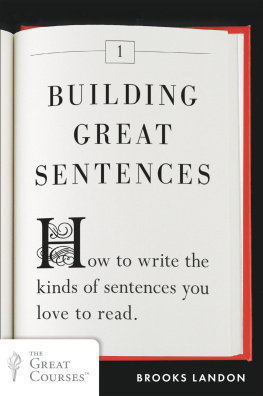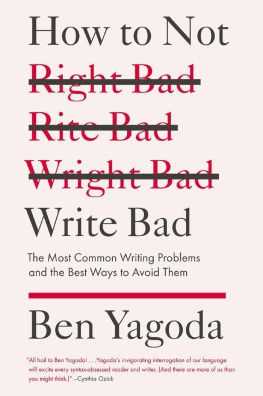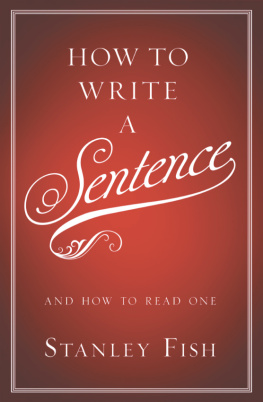Fish - How to write a sentence and how to read one
Here you can read online Fish - How to write a sentence and how to read one full text of the book (entire story) in english for free. Download pdf and epub, get meaning, cover and reviews about this ebook. City: New York;Enfield, year: 2011;2012, publisher: HarperCollins&HarperPaperbacks, genre: Romance novel. Description of the work, (preface) as well as reviews are available. Best literature library LitArk.com created for fans of good reading and offers a wide selection of genres:
Romance novel
Science fiction
Adventure
Detective
Science
History
Home and family
Prose
Art
Politics
Computer
Non-fiction
Religion
Business
Children
Humor
Choose a favorite category and find really read worthwhile books. Enjoy immersion in the world of imagination, feel the emotions of the characters or learn something new for yourself, make an fascinating discovery.
- Book:How to write a sentence and how to read one
- Author:
- Publisher:HarperCollins&HarperPaperbacks
- Genre:
- Year:2011;2012
- City:New York;Enfield
- Rating:4 / 5
- Favourites:Add to favourites
- Your mark:
- 80
- 1
- 2
- 3
- 4
- 5
How to write a sentence and how to read one: summary, description and annotation
We offer to read an annotation, description, summary or preface (depends on what the author of the book "How to write a sentence and how to read one" wrote himself). If you haven't found the necessary information about the book — write in the comments, we will try to find it.
Fish: author's other books
Who wrote How to write a sentence and how to read one? Find out the surname, the name of the author of the book and a list of all author's works by series.
How to write a sentence and how to read one — read online for free the complete book (whole text) full work
Below is the text of the book, divided by pages. System saving the place of the last page read, allows you to conveniently read the book "How to write a sentence and how to read one" online for free, without having to search again every time where you left off. Put a bookmark, and you can go to the page where you finished reading at any time.
Font size:
Interval:
Bookmark:
To the Memory of Lucille Reilly Parry,
Teacher, 19112010
One day the Nouns were clustered in the street.
An Adjective walked by, with her dark beauty.
The Nouns were struck, moved, changed.
The next day a Verb drove up, and created the Sentence.
Kenneth Koch, Permanently
Youre much too much, and just too very, very
To ever be in Websters Dictionary
And so Im borrowing a love song from the birds
To tell you that youre marvelous
Too marvelous for words.
Johnny Mercer, Too Marvelous for Words
Contents
CHAPTER 1
Why Sentences?
In her book The Writing Life (1989), Annie Dillard tells the story of a fellow writer who was asked by a student, Do you think I could be a writer? Well, the writer said, do you like sentences? The student is surprised by the question, but Dillard knows exactly what was meant. He was being told, she explains, that if he liked sentences he could begin, and she remembers a similar conversation with a painter friend. I asked him how he came to be a painter. He said, I like the smell of paint. The point, made implicitly (Dillard does not belabor it), is that you dont begin with a grand conception, either of the great American novel or a masterpiece that will hang in the Louvre. You begin with a feel for the nitty-gritty material of the medium, paint in one case, sentences in the other.
But wouldnt the equivalent of paint be words rather than sentences? Actually, no, because while you can brush or even drip paint on a canvas and make something interesting happen, just piling up words, one after the other, wont do much of anything until something else has been added. That something is named quite precisely by Anthony Burgess in this sentence from his novel Enderby Outside (1968):
And the words slide into the slots ordained by syntax, and glitter as with atmospheric dust with those impurities which we call meaning.
Before the words slide into their slots, they are just discrete items, pointing everywhere and nowhere. Once the words are nestled in the places ordained for themordained is a wonderful word that points to the inexorable logic of syntactic structuresthey are tied by ligatures of relationships to one another. They are subjects or objects or actions or descriptives or indications of manner, and as such they combine into a statement about the world, that is, into a meaning that one can contemplate, admire, reject, or refine. Virginia Tufte, whose book Artful Sentences (2006) begins with this sentence of Burgesss, comments: It is syntax that gives the words the power to relate to each other in a sequence... to carry meaningof whatever kindas well as glow individually in just the right place. Flauberts famous search for the mot juste was not a search for words that glow alone, but for words so precisely placed that in combination with other words, also precisely placed, they carve out a shape in space and time. Here is Dillard again: When you write you lay out a line of words. The line of words is a miners pick, a woodcarvers gouge, a surgeons probe. You wield it and it digs a path you follow. And when you come to the end of the path, you have a sentence. Flaubert described himself in a letter as being in a semi-diseased state, itching with sentences. He just had to get them out. He would declaim them to passersby.
I wish I had been one of them. Some people are bird watchers, others are celebrity watchers; still others are flora and fauna watchers. I belong to the tribe of sentence watchers. Some appreciate fine art; others appreciate fine wines. I appreciate fine sentences. I am always on the lookout for sentences that take your breath away, for sentences that make you say, Isnt that something? or What a sentence! Some of my fellow sentence appreciators have websites: Best Sentences Ever, Sentences We Love, Best First Sentences, Best Last Sentences. Invariably the sentences that turn up on these sites are not chosen for the substantive political or social or philosophical points they make. They are chosen because they are performances of a certain skill at the highest level. The closest analogy, I think, is to sports highlights; you know, the five greatest dunks, or the ten greatest catches, or the fifteen greatest touchdown runbacks. The response is always, Wasnt that amazing? or Can you believe it? or I cant for the life of me see how he did that, or What an incredible move! or Thats not humanly possible. And always the admiration is a rueful recognition that you couldnt do it yourself even though you also have two hands and feet. It is the same with sentences that do things the language you use every day would not have seemed capable of doing. We marvel at them; we read them aloud to our friends and spouses, even, occasionally, to passersby; we analyze them; we lament our inability to match them.
One nice thing about sentences that display a skill you can only envy is that they can be found anywhere, even when youre not looking for them. I was driving home listening to NPR and heard a commentator recount a story about the legendary actress Joan Crawford. It seems that she never left the house without being dressed as if she were going to a premiere or a dinner at Sardis. An interviewer asked her why. She replied, If you want to see the girl next door, go next door. It is hardly surprising that Joan Crawford had thought about the importance to fans of movie stars behaving like movie stars (since her time, there has been a sea change; now, courtesy of paparazzi, we see movie stars picking up their laundry in Greenwich Village or Brentwood); what may be surprising is that she could convey her insight in a sentence one could savor. It is the bang-bang swiftness of the short imperative clausego next doorthat does the work by taking the commonplace phrase the girl next door literally and reminding us that next door is a real place where one should not expect to find glamour (unless of course one is watching Judy Garland singing The Boy Next Door in Meet Me in St. Louis ).
A good sentence can turn up in the middle of a movie where it shines for an instant and then recedes as the plot advances. At one point in The Magnificent Seven (1960), the bandit leader, played by Eli Wallach, explains why he isnt bothered much by the hardships suffered by the peasant-farmers whose food and supplies he plunders:
If God didnt want them sheared, he would not have made them sheep.
The sentence is snapped off, almost like the flick of a whip; it has the form of proverbial wisdom (a form we shall look at later), and the air of finality and certainty it aspires to is clinched by the parallelism of clauses that also feature the patterned repetition of consonants and vowels: didnt want and would not have, sheared and sheep. We know that sheep is coming because of sheared and when it arrives it seems inevitable and, at least from one perspective, just. Not bad for a bandit.
Even children can produce a good sentence. My mother-in-law, Lucille Reilly Parry, was a grade-school teacher and she recalled a day when a large box was delivered to the school. No one knew where it had come from or what it was, and she gave her fourth-grade students the assignment of writing something about it. One student began her essay with this sentence:
I was already on the second floor when I heard about the box.
What is noteworthy about this sentence is its ability to draw readers in and make them want more. It is a question of what we know and dont know. We know that the writer was in the middle of something (I was already) but we dont know what; neither do we know how she learned about the box or what effect (if any) the fact of it had on what she was in the course of doing. And so we read on in the expectation of finding out. Many practiced writers would kill for a first sentence that good.
I found another of my favorite sentences while teaching the last big school-prayer case, Lee v. Weisman (1992). Mr. Weisman brought a cause of action against Nathan Bishop Middle School in Providence, Rhode Island (the same school I attended many decades ago), because a thoroughly secular prayer had been read at his daughters graduation. Weisman regarded the prayer as a breach of the First Amendments prohibition against the states establishing of a religion. A majority of the Supreme Court justices agreed with him and reasoned that even though the prayer had no sectarian content and made no demands on the students, who were free to ignore it, its very rehearsal was an act of psychological coercion. This was too much for Justice Scalia, who, after citing a fellow jurists complaint that establishment clause jurisprudence was becoming so byzantine that it was in danger of becoming a form of interior decorating, got off this zinger:
Font size:
Interval:
Bookmark:
Similar books «How to write a sentence and how to read one»
Look at similar books to How to write a sentence and how to read one. We have selected literature similar in name and meaning in the hope of providing readers with more options to find new, interesting, not yet read works.
Discussion, reviews of the book How to write a sentence and how to read one and just readers' own opinions. Leave your comments, write what you think about the work, its meaning or the main characters. Specify what exactly you liked and what you didn't like, and why you think so.

